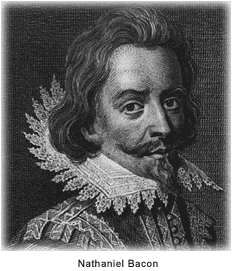During the 1670s, the administration of veteran Virginia governor Sir William Berkeley became unpopular with small farmers and frontiersmen, because of the following reasons:
 In 1673, Nathaniel Bacon, a distant relative of Governor Berkeley, emigrated from England under murky circumstances and set up a small plantation on the James River. He rose rapidly in public esteem and was appointed to the governor’s council. The Indian issue soon polarized the two men.
In 1673, Nathaniel Bacon, a distant relative of Governor Berkeley, emigrated from England under murky circumstances and set up a small plantation on the James River. He rose rapidly in public esteem and was appointed to the governor’s council. The Indian issue soon polarized the two men.
After failing to extract a promise of action against the tribes, Bacon recruited a small armed force and in 1676 conducted two forays against the enemy. Berkeley was incensed, but Bacon became a popular hero and was elected to the House of Burgesses. When Bacon tried to take his seat in the assembly, he was arrested by the governor’s agents.
Soon released, Bacon raised a small army again and marched on Jamestown. The governor fled and the burgesses hastily enacted measures designed to subdue the Indians. Berkeley quickly returned with soldiers of his own and branded Bacon a rebel. The rebel forces initially prevailed, but they doubted their ability to hold out in Jamestown for an extended period and opted to torch the village instead.
Bacon became ill with dysentery and died in the fall of 1676; the rebellion collapsed immediately. Berkeley briefly returned to power and relentlessly hunted down the rebels before being recalled to England.
The rebellion's results were mixed: An unpopular governor had been temporarily removed. Real progress was made toward thwarting the Indian threat. The tribes realized that they stood little chance against the settlers' superior firepower and signed another peace treaty in 1677.
However, the political strength of the common farmers and laborers had not improved - they would long remain in the shadow of the Tidewater gentry. Further, these plantation-owning families came to realize that unemployed former indentured servants were a threat to social stability. They turned increasingly to the use of slaves, who were regarded as a safer source of labor and were less expensive.